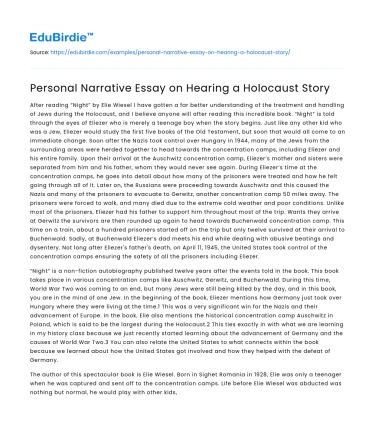Introduction
Hearing a Holocaust story is an experience that transcends mere historical learning; it is a profound encounter that challenges our understanding of human nature, morality, and the consequences of prejudice. The Holocaust, a catastrophic episode in the 20th century, continues to resonate deeply, not just due to its sheer scale of brutality but also because of its individual narratives of survival and loss. These stories serve as poignant reminders of the atrocities that can arise from unchecked hatred and discrimination. Often, survivors recount their experiences with a vividness that transports listeners to a time fraught with peril and despair, yet also with resilience and hope. This essay examines the impact of hearing a Holocaust story, particularly focusing on the emotional and intellectual dimensions of such narratives. It explores how these stories challenge preconceived notions, evoke empathy, and serve as vital educational tools in preventing future atrocities.
Hearing the personal accounts of Holocaust survivors offers a unique perspective that goes beyond the pages of history books. These narratives bring to life the stark realities of the concentration camps, the ghettos, and the arduous journeys of escape and survival. They also confront listeners with the moral complexities faced by individuals during the Holocaust, prompting reflection on the capacity for both good and evil within humanity.
Save your time!
We can take care of your essay
- Proper editing and formatting
- Free revision, title page, and bibliography
- Flexible prices and money-back guarantee
The Emotional Impact of Survivor Testimonies
The emotional impact of hearing a Holocaust story cannot be overstated. Survivor testimonies often elicit a visceral response, drawing listeners into the harrowing experiences of those who lived through one of history's darkest periods. One such example is the testimony of Elie Wiesel, whose autobiographical account, "Night," offers a haunting portrayal of his experiences in Auschwitz and Buchenwald. Wiesel's narrative, imbued with raw emotion, confronts readers with the brutal reality of life in the concentration camps, where every day was a struggle for survival. His poignant descriptions of suffering, loss, and the struggle to maintain faith in humanity resonate deeply, evoking empathy and sorrow.
Furthermore, survivor stories personalize the Holocaust, transforming abstract statistics into tangible human experiences. Listening to a survivor recount how they were separated from their family at the train station, or how they witnessed the inhumane conditions of the camps, makes the enormity of the Holocaust more accessible and relatable. As noted by psychologist Dori Laub, who has extensively studied Holocaust testimonies, these narratives allow for a "witnessing" of the events, enabling listeners to bear witness to the survivors' pain and resilience. Such encounters often lead to a profound emotional engagement, fostering a deeper understanding of the Holocaust's impact on individuals and communities.
However, the emotional intensity of these narratives can also be overwhelming, leading some to question the ethical implications of subjecting listeners to such distressing content. Critics argue that the emotional distress caused by these stories may be counterproductive, potentially desensitizing individuals to the suffering of others. Nevertheless, many scholars assert that the emotional engagement elicited by survivor testimonies is essential for fostering empathy and ensuring that the lessons of the Holocaust are not forgotten.
Intellectual and Moral Reflections
Beyond the emotional impact, hearing a Holocaust story also provokes intellectual and moral reflections. Survivor narratives compel listeners to grapple with complex ethical questions and the broader implications of prejudice and discrimination. For instance, Primo Levi, an Italian Jewish chemist and Auschwitz survivor, challenges readers to reflect on the role of bystanders and the moral responsibilities of individuals in the face of injustice. In his seminal work, "If This Is a Man," Levi explores the dehumanizing effects of the concentration camps and the psychological mechanisms that allowed ordinary people to commit extraordinary atrocities.
These narratives also highlight the importance of memory and remembrance in preventing future atrocities. As Holocaust survivor and Nobel laureate Elie Wiesel famously stated, "To forget a Holocaust is to kill twice." By listening to survivor stories, individuals are reminded of the catastrophic consequences of hatred and intolerance, reinforcing the need for vigilance and action in combating discrimination and promoting human rights. The intellectual engagement prompted by these narratives encourages critical reflection on the societal conditions that allowed the Holocaust to occur, fostering a deeper understanding of the factors that contribute to such atrocities.
Critics, however, argue that the focus on individual narratives may obscure the broader historical context of the Holocaust, potentially leading to a distorted understanding of the events. They contend that while personal stories are powerful, they should be complemented by a comprehensive examination of the historical, political, and social factors that facilitated the Holocaust. Nevertheless, many scholars agree that survivor narratives are an invaluable component of Holocaust education, offering unique insights that enrich our understanding of this complex historical event.
Conclusion
In conclusion, hearing a Holocaust story is a transformative experience that engages both the heart and mind. Survivor narratives offer a window into the lived experiences of those who endured unimaginable suffering, challenging listeners to confront the moral and ethical dimensions of human behavior. These stories serve as powerful educational tools, fostering empathy and understanding while reinforcing the imperative to remember and learn from the past. While there are valid concerns about the emotional impact and potential for distortion, the value of survivor testimonies in Holocaust education cannot be overstated. As we continue to grapple with the legacy of the Holocaust, it is essential to honor and preserve these narratives, ensuring that the lessons of history are not forgotten and that future generations are equipped to prevent such atrocities from occurring again.






 Stuck on your essay?
Stuck on your essay?

